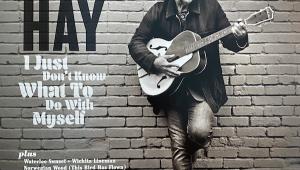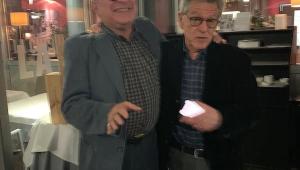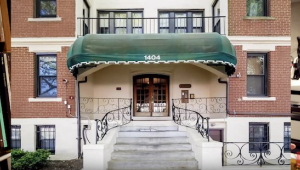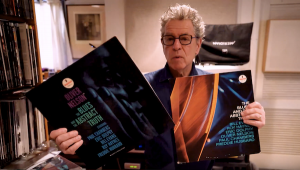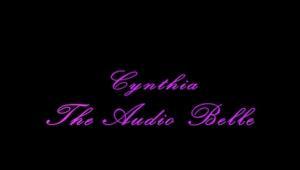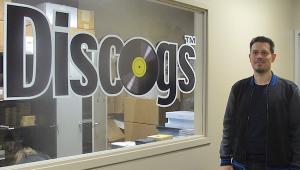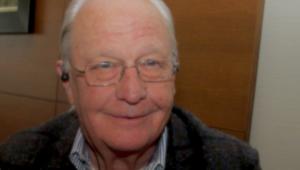Spinning Live Tales With Graham Nash
“I’ve been a harmony singer most of my life. I know what to do, and where to be.”
That’s Graham Nash, 80 years young, not only defining his artistic M.O. as a tenor vocalist, but also speaking to his inherent instincts for knowing what the right tones are for the music he’s making, and, frankly, where he stands on life and society in general.
If you’ve read Michael Fremer’s treatise on the 51st anniversary of Crosby, Stills, Nash & Young’s benchmark March 1970 Déjà vu album, then you already know how attuned Nash is to the way his voice sounds (and/or should sound) on record. Nash also knows how to project his voice onstage, and his new 180-gram gatefold 2LP set from Proper Records, Graham Nash Live: Songs for Beginners / Wild Tales, which was released on May 6, proves that fact quite amply. Mixed by Kevin Killen and mastered by Bob Ludwig at Gateway Mastering, Live was pressed at Precision Record Pressing in Burlington, Ontario for North America and The Vinyl Factory in Hayes, West London for Europe.
Live’s content is culled from various stops on Nash’s September 2019 tour in the Northeastern quadrant of the U.S., during which he and his ace band played all 20 songs that comprise his first two solo albums — May 1971’s Songs for Beginners and January 1974’s Wild Tales (both originally released on Atlantic Records) — and they appear in their respective full running orders to boot, each contained to one disc apiece to mirror the original album’s side breaks. Audience chatter and ambient live noise are mostly absent here save mainly for applause, which may raise an eyebrow if you’ve ever attended any of the man’s gigs like I have numerous times over the years, wherein you tend to find Nash unafraid to engage directly with his audiences. However, the goal for Live was to preserve and respect the integrity of the natural flow of the original recordings rather than turn the proceedings into, well, a hootenanny of sorts.
Recently, Nash and I got on the horn to discuss the making of Live, the importance of a sense of space in recordings, and why many of his songs retain a timeless quality to them. The ending of the tale / Is the singing of the song. . .
Mike Mettler: In terms of the two studio records you drew on for the Live album, I feel like I get the true balance of the light and the dark side of Graham Nash. I think Songs for Beginners is light, and Wild Tales is very dark. That had to be part of your creative mentality, as I’ll call it, when you were working on them.
Graham Nash: That is correct. Absolutely. I was most depressed during the making of Wild Tales — and it shows. it shows in my music. It shows in the way I recorded — it just shows. I was really bummed out, you know? I had finished my relationship with Joni [Mitchell], and I didn’t have a home. I was depressed — and I admit it. So what? (chuckles)
Mettler: I’d say that’s the honesty of a songwriter in action. Since you’ve often said you always want to evoke positivity and good feelings in people, was that hard as an artist to feel like you had to, I hate to say, be negative, but at least be on the darker side of who people expect you to be?
Nash: Yeah, because my fans realize I’m just like them! I’m an ordinary person, just like them. I do something different with my life and my time, and I know that. I understand I am a musician. But, hey, God bless ’em all.
Mettler: Amen. Did you personally interact with Kevin Killen and Bob Ludwig and tell them how you wanted things to sound on the Live album?
Nash: What happens with me is this. Once I find someone I can trust — for instance, I’ve worked with Bob Ludwig for almost 50 years, and therefore, I trust him. And therefore, there’s no need for me to do that.
The only time we spoke directly was when he mastered the Live album. He called me and he said, “You know, I worked on the original Songs for Beginners, and I worked on the original Wild Tales. I have to tell you one thing. You are singing better than you ever did.”
Mettler: Wow.
Nash: And I made it when I was 79, so that’s an incredible compliment coming from Bob Ludwig.
Mettler: Yeah. Yeah, he’s got the golden ears, for sure.
Nash: Yes he does — and so does Kevin Killen too. He’s great! He’s a great mixer. He’s mixing my new studio record right now, in fact.
Mettler: Oh, good. Well, that’s something we’ll have to talk about when it’s ready for consumption.
Nash: Yes, yes. Well, I’ll tell you something — we will talk again about my new studio record.
Mettler: That works for me. Is that record coming out this year, or next year?
Nash: It depends. I’m one song away from, well, what I consider to be a really fine piece of work. And with a fine piece of work, every track has to be great — and that’s what I’m trying to do. So, I don’t quite know when it’s going to come out. I’m not sure exactly right now, because I have not quite finished it. It’s better than my last album [April 2016’s This Path Tonight] — and I really liked that one too.
Mettler: Well, so did I.
Nash: I live in Manhattan, and I’ve been recording a lot of my new studio record in Williamsburg [in Brooklyn]. [Nash solo band keyboardist/vocalist] Todd Caldwell lives in Williamsburg. He has a small studio in his house, and I go there every other day, until I’m finished.
Mettler: Okay, we’ll put a pin in that for now, and talk again once it’s completed. Why do you think Bob Ludwig thinks you’re singing better than ever? Do you have a perception of why your voice still holds up? I mean, you’re officially 80 now, according to the clock. So, how do you do it? What’s the secret?
Nash: I have no secret. (MM laughs) I don’t know why! I don’t have a vocal coach. I don’t have lessons. I don’t do anything. I just f---ing open my mouth, and sing.
Mettler: Well, it’s got to come from your soul, then.
Nash: I hope that’s true. I just finished a sold-out 22-show tour [which took place during March-April 2022], and one of the things that really appealed to me was a lot of the people had saved their tickets from two years ago [when the tour was originally scheduled, pre-pandemic shutdowns]. I talked to them, and I said, “You know what that means to me?” And they said, “I don’t know. What does that mean to you?” I said, “That means hope. That means, you’re gonna think that tomorrow is gonna be a better day.”
And that’s how English people face the world. It may be f---ed right now, but tomorrow’s gonna be a beautiful day!
Mettler: Yeah, well, what’s that line from another British band — “Quiet desperation is the English way”?
Nash: (laughs) Oh, is that true! “Quiet desperation” — that’s funny! It’s quite true, though.
Mettler: That’s a Pink Floyd line, from “Time” [one of the many pivotal tracks from March 1973’s The Dark Side of the Moon]. And you know those guys quite well, of course.
Nash: I love David [Gilmour]. He’s a great guitar player.
Mettler: No arguments here.
[MM notes: Nash, along with his estranged vocal foil David Crosby, lent his vocal talents to not only the title track of David Gilmour’s March 2006 solo album On an Island but also to “A Boat Lies Waiting,” which can be found on Gilmour’s September 2015 release, Rattle That Lock. At the pair of shows held at Radio City Music Hall in New York City on April 4 and 5, 2006, during Gilmour’s On an Island Tour, both Crosby and Nash came onstage to sing background and harmony vocals on the aforementioned “On an Island” and “The Blue,” as well as on Gilmour’s take on Pink Floyd’s “Shine On You Crazy Diamond (Parts I-V)” and a stirring rendition of Crosby, Stills, Nash & Young’s “Find the Cost of Freedom” during the encore. Yours truly saw, and very much enjoyed, the entirety of the show from my left-side orchestra-level seat at Radio City during the April 4, 2006 performance.]
Mettler: I always enjoy watching Gilmour’s control on the Strat and the way he plays with that whammy, along with his Spanish guitar playing, and his lap steel work too. And speaking of lap steel sounds, I believe we have an expert playing right alongside you on Live — namely, Mr. Shane Fontayne. [Fontayne plays lap steel guitar on “Wild Tales” and “Grave Concern.”]
Nash: Oh, yes — Shane Fontayne! I’ve been making music with Shayne for almost 15 years — and there’s a good reason. Not only is he a phenomenal guitar player, but he’s not always looking for his solo. He’s always looking for the best way to present the song right now. And I love that about him.
I mean, you gotta understand — Shane Fontayne saw The Hollies when he was 12 years old! (chuckles) And he loved us then. [The London-born Fontayne, then known by his given name, Michael Barakan, saw Nash doing his thing with The Hollies in 1966.] And so, yeah, Shane Fontayne is a great, great musician. And so is Todd Caldwell, by the way.
Mettler: Yeah. Todd, your keyboard man. I feel like, with these guys, it’s like an intuitive sense of, they just know what to do for you.
Nash: Exactly — for the song.
Mettler: And that’s the key, right? If the song isn’t being supported, you don’t need somebody wailing off into the distance, or doing something that’s just exploratory.
Nash: That’s right. Yeah. Neither of these musicians are those kinds of musicians, you know? They want the song to live.
Mettler: They do a good job. Tell me about the feeling you want people to have as Live listeners. When we first talked about Beginners over a decade ago, you told me you wanted us to feel like we’re right next to you in the space you’re occupying as a performer. How does that translate to a live recording?
Nash: That’s a very important space — that space. For listeners, I want them to know I’m going to sing these songs with the same bloody passion I had when I wrote them. Because my audience deserve that — they deserve the best of me. And that’s what I’m always trying to present — the best of my songs sung and played the best way I can.
Mettler: Did having somebody like Kevin Killen or Bob Ludwig in your ear help with that? Back in the day, when you signed off on a mix, did you ever get something back as the master that made you say, “This isn’t what I signed off on,” or “This isn’t what I wanted it to sound like”? Did you ever have to deal with that?
Nash: Nope! I’ve never done that. Like I said, Ludwig is really, really good at what he does. And he is also a song master. He loves a song, you know?
Mettler: Yeah, I get that. We’ve talked about the art of songwriting before and how it’s a mystery to some degree, but I feel like what you do besides the art of it is, there’s also a crafting point to the song. Like, once you write it, then you have to craft getting the emotion across to us as a listener.
Nash: Exactly! You know, I’ve been doing that for over 65 years in my life — and it’s like a muscle. You’ve gotta keep it exercised. You gotta keep the blood flowing through it. It’s just like a muscle — and I’ve been doing it a long time, so I’m in charge of my muscle.
Mettler: You talked about Shane seeing The Hollies as a kid, and we get to hear you do “Bus Stop” in your current live set.
Nash: Yes.
[MM notes: “Bus Stop” hit No.5 on the Billboard singles chart in September 1966, and it also reached No. 5 on the UK Singles chart that year as well. The Hollies’ October 1966 Imperial Records Bus Stop LP in mono has always been a favorite of mine, albeit now long-retired to my shelves. The Sundazed Music 2011 mono reissue is much preferred, but that’s a story for another time.]
Mettler: Do you feel you’re connecting with so many more generations with a song like “Bus Stop,” a song that’s many, many decades beyond its release?
Nash: It’s wild, isn’t it? But it happens to a lot of my songs — and, quite frankly, I take it as a compliment, and something that’s f---ed also. And the compliment is, my music seems to have lasted over 50 years. And the f---ed thing about it is, we haven’t learned from history.
Mettler: Right? I mean, hello — “Military Madness” [the opening track on both Beginners and on Side One of Live] is totally 2022.
Nash: I had to change the beginning of my show on the tour I just did, the one I told you about earlier. Normally, I would come out and do one of the minor hits so everyone can take off their jackets and get in their seat and get ready for the concert, right? Because of what’s going on between Putin and Ukraine, I have to tell them, “Look, I’m starting my show in a different way.” I started with [CSNY’s aforementioned] “Find the Cost of Freedom” a capella, and then followed that with “Military “Madness” while I was still talking about Putin and Ukraine. And after that, I then began a “normal” show.
Mettler: I would even say [the Beginners song] “I Used to Be a King” fits into that kind of vibe too.
Nash: Absolutely. It is quite amazing. You know, I seem to have written about stuff that will still be here. Mankind is a brilliant, brilliant creature, but at the same time, as you and I are speaking about wonderful things, people are being blown the f--- out of in Ukraine. As we speak.
Mettler: That’s literal madness, yes.
Nash: I want everything to get better. So, I’m coming in frustrated and surprised. It’s not an incredibly difficult lesson to learn — stop f---ing killing people because of what you want. It’s not a hard equation. But you have to keep positive about things, and you have to think things will get better. Will they get better? I don’t know.
Mettler: I don’t know either. But right now, I’d rather think about the phrase, “music gets you high,” to borrow a line from the Wild Tales song “And So It Goes.” And then we can also go back to a song like “Wounded Bird” [from Beginners], which is also very of-the-moment as anything is.
Nash: Yeah. ’Cause we’re all going through those kinds of changes. All of us, right now — all of us out there are going through all of these changes I write about. And I realize, if it’s happening to me, there’s a good chance it’s happening to you.
Mettler: Yeah. Well, that’s the songwriter’s relatability again. Okay, one last thing before I go. Certain songs of yours have lasted for 50-plus years, but if we project 50 years beyond where we are right now, unless science keeps us alive, we may not be physically on the planet. When somebody plays a Graham Nash-written song in 2072, what would you hope they think or feel about it?
Nash: I would hope they would realize what they’re saying or what they’re singing is about, and that they sing it with honesty and passion.
- Log in or register to post comments

that Nash and David Crosby are no longer singing together. Their voices have a blend that's rare and beautiful. Nash wrote some things in his autobiography "Wild Tales" that Crosby says never happened, and Crosby has admitted that when he's around the other CSNY guys he tends to turn into a total asshole.

...it's getting to the point where he's no fun anymore? I am sorry.

All else is just ancient history and will never happen again.
To wish for the past is just 'memberberries'...

You know Nash's music very well, as well as what makes him artistically.

Quiet desperation btw comes from Thoreau in Walden, mid-19th century New England.

one of my fav albums

Graham Nash has inspired young people. A tenor who knows how much he is capable of trying every day geometry dash bloodbath

At 80 years young, he continues to captivate us with his timeless talent. | www.drywallgreensboro.com

Dobrý deň. Používam túto webovú stránku https://skhra.com/go4games-casino/ na preskúmanie rôznych online kasín a kvalita recenzií na mňa neustále robí dojem. Stránka ponúka hĺbkové analýzy ponúk jednotlivých kasín, čo mi umožňuje robiť informované rozhodnutia o tom, kde hrať. Nedávno som si prečítal recenziu na kasíno Go4games a tá mi poskytla cenné informácie o tejto platforme. Recenzia pokrývala všetky dôležité aspekty kasína, od výberu hier až po bezpečnostné opatrenia, a pomohla mi tak určiť, či je pre mňa tou správnou voľbou. Túto stránku vrelo odporúčam každému, kto hľadá spoľahlivé informácie o online kasínach.

The precision in projecting his voice both on record and onstage is evident in this meticulously crafted release, a testament to his enduring musical legacy in El Paso.

Graham Nash is one of my dads favorite of all time!
I have no idea how he does it!
https://www.dinosafetysurfacing.com

Graham Nash was one of my mom's favorite. Especially the song "simple man" she told me that she would listen to his song over and over. Electrician Chilliwack



